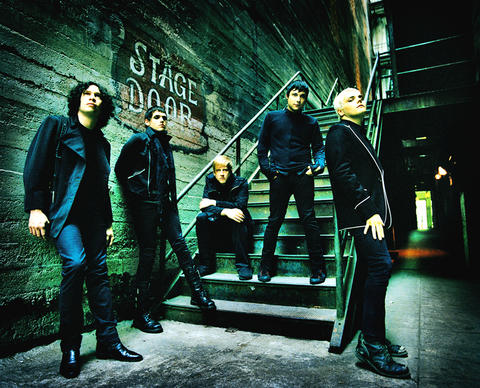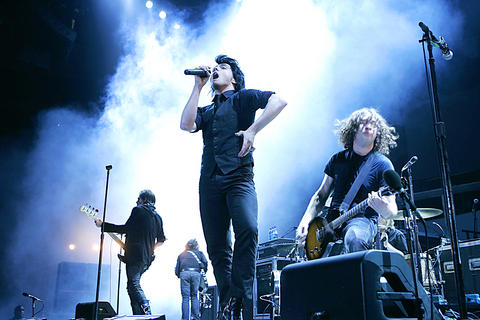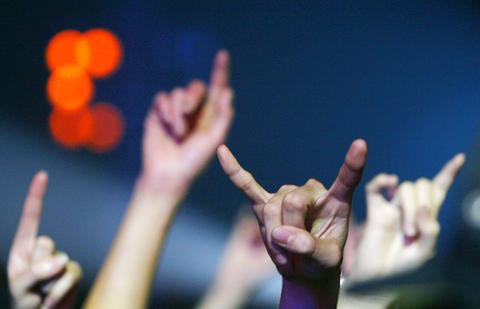My Chemical Romance (MCR) is, perhaps, one of today's most loved and hated rock groups.
The band's 2006 platinum-selling album The Black Parade, which spawned a tour of the same name, elicites a bizarre mixture of accolades and abuse. In a poll conducted by the UK's biggest weekly music magazine, Kerrang, MCR won Best Band and Best Album categories. The group, however, also received a drubbing, winning (if that can be said) the same poll's awards for Worst Band and Worst Album.
The band also bagged the Best Thing about 2006 and Worst Thing about 2006 categories.

As of press time, the band, which was formed in 2001, has sold roughly 3,500 of the 5,000 seats available for its Sunday one-off gig at National Taiwan University Athletic Stadium.
Compare this to Linkin Park two months earlier, a rock group that sold most of its 38,000 tickets a few weeks before the show. It would seem that concertgoers in Taiwan share the same ambiguity towards MCR as respondents to the poll conducted by Kerrang.
"My Chemical Romance is not as well known in Taiwan as Linkin Park … [because] it's louder," said Louisa Lee, a DJ with ICRT and host of Weekend Buzz. "It caters to a younger crowd - people who can't afford to go concerts," she said referring to the teenagers who treat the quintet's members - singer Gerard Way and his brother, bass guitarist Mikey, rhythm guitarist Frank Iero, lead guitarist Ray Toro and drummer Bob Bryar - like gods.

Where Linkin Park remained at the top of local charts for international pop acts, MCR has had problems making inroads into the island's music scene. The Black Parade sold 6,000 copies here.
That teenagers adore the band may seem odd considering that MCR's musical influences are a combination of 1970s concept music and 1980s glam rock - genres that were reaching the peak of their popularity before most of MCR's audience was born.
Rolling Stone Magazine wrote in a review of The Black Parade that "the [album's] opening fanfare, The End, blows up like an outtake from Alice Cooper's Billion Dollar Babies, with glam-Godzilla guitars and spook-choir hurrahs. Dead! is a sleek, bleak bruiser, like Queen's Keep Yourself Alive … ." The album came highly recommended.

Though the group's musical influences are firmly planted in the 1970s and 1980s, MCR's angst is pure post-Sept. 11. Front man Gerard Way's first song written for the group, Skylines and Turnstiles, was based on his experiences of watching the twin towers crumble in New York City. Rubble and dust have informed his Gothic sensibility and nihilistic lyrics of death ever since.
The Black Parade is a concept album a la Queen, whose story bears a striking similarity to Pink Floyd's The Wall, in which the protagonist runs through a gamut of childhood and adulthood traumas - reflected in the show's larger than life sets (featuring a warped castle) and Gothic costume designs. It has already been performed at more than 100 coliseums and concert halls across the globe.
My Chemical Romance's Asian leg of its international tour also includes dates in South Korea, the Philippines, Hong Kong and Indonesia.

Daphne Lee (李志揚), a spokesperson for Warner Music Taiwan, said the band won't be staging its rock-opera for at the Taipei gig. But audiences shouldn't be disappointed because MCR is going to draw upon the band's entire repertoire of tunes. As such, expect the music to range from its earlier emo-inspired pop tracks from 2002's album I Brought You My Bullets, You Brought Me Your Love to the later obsessions with mortality found on The Black Parade.


April 14 to April 20 In March 1947, Sising Katadrepan urged the government to drop the “high mountain people” (高山族) designation for Indigenous Taiwanese and refer to them as “Taiwan people” (台灣族). He considered the term derogatory, arguing that it made them sound like animals. The Taiwan Provincial Government agreed to stop using the term, stating that Indigenous Taiwanese suffered all sorts of discrimination and oppression under the Japanese and were forced to live in the mountains as outsiders to society. Now, under the new regime, they would be seen as equals, thus they should be henceforth

Last week, the the National Immigration Agency (NIA) told the legislature that more than 10,000 naturalized Taiwanese citizens from the People’s Republic of China (PRC) risked having their citizenship revoked if they failed to provide proof that they had renounced their Chinese household registration within the next three months. Renunciation is required under the Act Governing Relations Between the People of the Taiwan Area and the Mainland Area (臺灣地區與大陸地區人民關係條例), as amended in 2004, though it was only a legal requirement after 2000. Prior to that, it had been only an administrative requirement since the Nationality Act (國籍法) was established in

Three big changes have transformed the landscape of Taiwan’s local patronage factions: Increasing Democratic Progressive Party (DPP) involvement, rising new factions and the Chinese Nationalist Party’s (KMT) significantly weakened control. GREEN FACTIONS It is said that “south of the Zhuoshui River (濁水溪), there is no blue-green divide,” meaning that from Yunlin County south there is no difference between KMT and DPP politicians. This is not always true, but there is more than a grain of truth to it. Traditionally, DPP factions are viewed as national entities, with their primary function to secure plum positions in the party and government. This is not unusual

US President Donald Trump’s bid to take back control of the Panama Canal has put his counterpart Jose Raul Mulino in a difficult position and revived fears in the Central American country that US military bases will return. After Trump vowed to reclaim the interoceanic waterway from Chinese influence, US Defense Secretary Pete Hegseth signed an agreement with the Mulino administration last week for the US to deploy troops in areas adjacent to the canal. For more than two decades, after handing over control of the strategically vital waterway to Panama in 1999 and dismantling the bases that protected it, Washington has